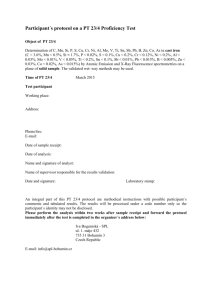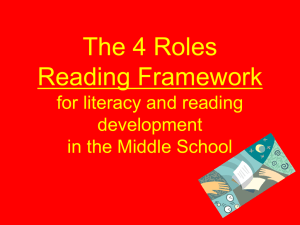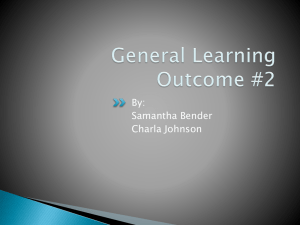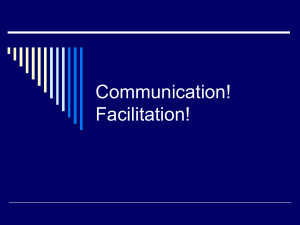Conducting the planning and assessment conversation
advertisement
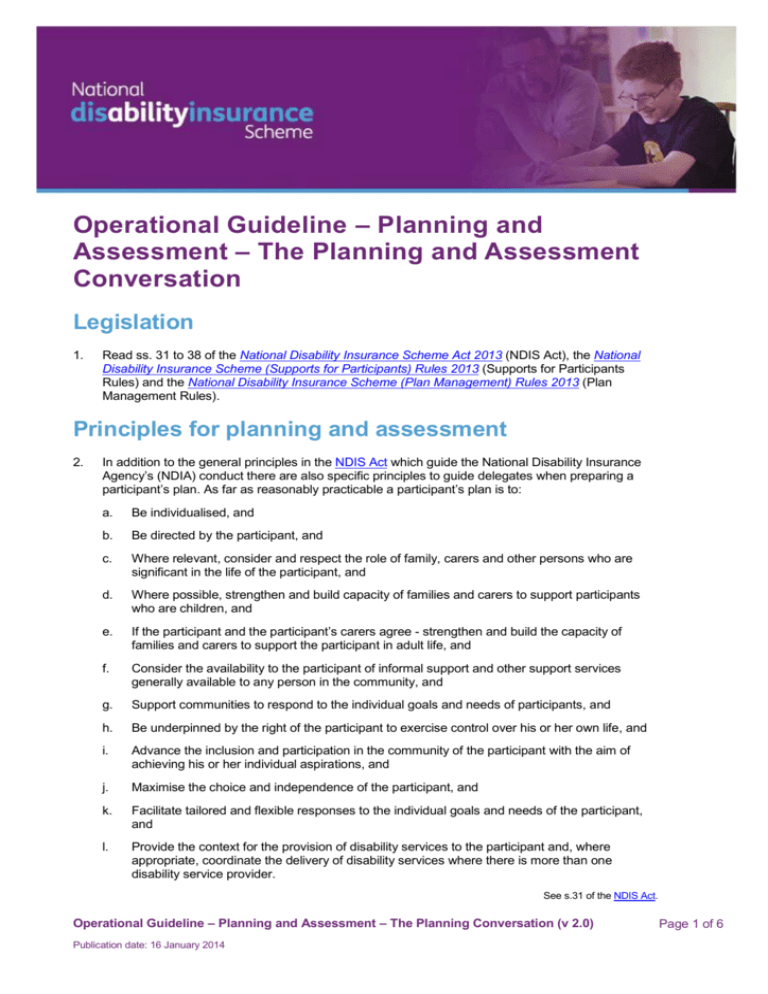
Operational Guideline – Planning and Assessment – The Planning and Assessment Conversation Legislation 1. Read ss. 31 to 38 of the National Disability Insurance Scheme Act 2013 (NDIS Act), the National Disability Insurance Scheme (Supports for Participants) Rules 2013 (Supports for Participants Rules) and the National Disability Insurance Scheme (Plan Management) Rules 2013 (Plan Management Rules). Principles for planning and assessment 2. In addition to the general principles in the NDIS Act which guide the National Disability Insurance Agency’s (NDIA) conduct there are also specific principles to guide delegates when preparing a participant’s plan. As far as reasonably practicable a participant’s plan is to: a. Be individualised, and b. Be directed by the participant, and c. Where relevant, consider and respect the role of family, carers and other persons who are significant in the life of the participant, and d. Where possible, strengthen and build capacity of families and carers to support participants who are children, and e. If the participant and the participant’s carers agree - strengthen and build the capacity of families and carers to support the participant in adult life, and f. Consider the availability to the participant of informal support and other support services generally available to any person in the community, and g. Support communities to respond to the individual goals and needs of participants, and h. Be underpinned by the right of the participant to exercise control over his or her own life, and i. Advance the inclusion and participation in the community of the participant with the aim of achieving his or her individual aspirations, and j. Maximise the choice and independence of the participant, and k. Facilitate tailored and flexible responses to the individual goals and needs of the participant, and l. Provide the context for the provision of disability services to the participant and, where appropriate, coordinate the delivery of disability services where there is more than one disability service provider. See s.31 of the NDIS Act. Operational Guideline – Planning and Assessment – The Planning Conversation (v 2.0) Publication date: 16 January 2014 Page 1 of 6 Preparation and approach 3. An important part of developing a participant’s plan is the planning and assessment conversation. This will ensure that the plan is developed to the fullest extent possible by the participant. 4. The conversation may occur over several visits if that is convenient or helpful for the participant and will include use of the Assessment Tool. 5. The participant may invite whoever they wish to be included in the planning conversation however the delegate must ensure that the discussion reflects what the participant wishes rather than a supporter. The delegate must ensure that provider interests do not overwhelm the discussion with the participant. See Operational Guideline – General Conduct – Supporting Participant’s Decision-Making. 6. This Operational Guideline divides the conversation into four stages – preparing for the planning and assessment conversation, conducting the conversation, support needs assessments and documenting the conversation Preparing for the planning and assessment conversation – focus on the final decision 7. To ensure delegates are properly prepared to make the decision under s.33(2) to approve a plan it is important that throughout the planning and assessment process delegates keep in mind the criteria in the legislation that they will have to apply later when making the decision. These criteria are: a. The things that must be specified in a participants statement of goals and aspirations: i. The goals, objectives and aspirations of the participant, and ii. The environmental and personal context of the participant’s living, including the participant’s: A. Living arrangements, and B. Informal community supports and other community supports, and C. Social and economic participation. See s.33(1) of the NDIS Act and Operational Guideline – Planning and Assessment – Facilitating the Participant’s Statement of Goals and Aspirations. b. The things that must be specified in a statement of participant’s supports: i. The general supports (if any) that will be provided to, or in relation to, the participant, and ii. The reasonable and necessary supports (if any) that will be funded under the NDIS, and iii. The date by which, or the circumstances in which, the NDIA must review the plan, and iv. The management of the funding for supports under the plan, and v. The management of other aspects of the plan. See s.33(2) of the NDIS Act and Operational Guideline – Planning and Assessment – Supports in the Plan. c. The things that must be done when the delegate decides whether to approve a statement of participant’s supports: Operational Guideline – Planning and Assessment – The Planning Conversation (v 2.0) Publication date: 16 January 2014 Page 2 of 6 i. Have regard to the participant’s statement of goals and aspirations ii. Have regard to relevant assessments conducted in relation to the participant, and iii. Be satisfied as mentioned in s.34 in relation to the reasonable and necessary supports that will be funded and the general supports that will be provided including value for money and ensuring there is no duplication of supports, and iv. Apply the methods in Part 4 of the Supports for Participants Rules about the assessment tool and have regard to the criteria set out in Part 3, Part 5 and Schedule 1 of the Supports for Participants Rules in relation to the manner in which the reasonable and necessary supports will be funded, and v. Have regard to the principle that a participant should manage his or her plan to the extent that he or she wishes to do so, and vi. Have regard to the operation and effectiveness of any previous plans of the participant. See s.33(5) of the NDIS Act. 8. In considering whether to approve a statement of participant’s supports the delegate must also: a. Identify the participant’s goals, aspirations, strengths, capacity, circumstances and context, and b. Assess activity limitations, participation restrictions and support needs arising from a participant’s disability, and c. Assess risks and safeguards in relation to the participant, and d. Relate support needs to the participant’s statement of goals and aspirations. See r.4.1 of the Support for Participants Rules. 9. The list of things that a delegate must be satisfied about when considering the reasonable and necessary supports that will be provided or funded is set out in s.34 of the NDIS Act. See s.34 of the NDIS Act. 10. In preparing for the planning and assessment conversation with a participant, the delegate is to: a. Familiarise themselves with all relevant information available relating to the participant’s circumstances including the participant’s My Access Checker self-report, any existing support currently provided, and the participant’s statement of goals and aspirations (if available) b. Identify any potential barriers to participation in the assessment and planning discussion including reviewing what informal support is available to, or needed by the participant See Operational Guideline – General Conduct – Supporting Participant’s Decision-Making. c. Identify any gaps in the assessment information that may require attention in the assessment discussion d. Consider whether it is necessary to seek additional information or reports. Delegates have the power, which must only be exercised in accordance with all requirements in the NDIS Act and NDIS Rules, to request information or reports. See s.36 of the NDIS Act. e. Remind the participant of any information they need to bring to the discussion such as any relevant assessments, reports or other information not already provided, including evidence of age and residency to verify the participant’s access request. Operational Guideline – Planning and Assessment – The Planning Conversation (v 2.0) Publication date: 16 January 2014 Page 3 of 6 f. Involve the participant and any supporters in selecting convenient time(s) and venue(s) for the assessment discussion, and g. Plan ways to adjust the examples used and word the questions in a way that is most likely to be understood by the participant to ensure the process is meaningful in the participant’s individual circumstances and context. Conducting the planning and assessment conversation 11. In conducting the planning conversation the delegate is to: a. Keep the discussion person-centred by encouraging the participant to contribute in the way they wish to and are comfortable with contributing, b. Use the Assessment Tool in a flexible way to reflect the participant’s individual context and needs including by completing assessment sections and items in an order that suits the participant and the progress of discussion, and c. Explain the process as appropriate including by answering any questions the participant or any supporters may have. Support Needs Assessment Tool 12. The CEO has approved the Support Needs Assessment Tool (Assessment Tool) to be used to help assist in making decisions about a participant’s supports by determining a participant’s support needs. There is both an adult and child version of the Assessment Tool. The adult version will generally be used for participants aged 15 years and older. See s.209(2A) of the NDIS Act 2013 and r.4.4 of the Supports for Participants Rules. 13. The Assessment Tool is used in the context of informing the supports that a participant may need to progress towards their goals. 14. The Assessment Tool is to be used for the development of all plans. 15. The planning and assessment process is designed to be a holistic consideration of the participant’s abilities, their goals and the supports they need to enable them to achieve these goals. 16. The Assessment Tool enables the delegate to scope and define the participant’s particular needs taking into account their current living arrangements, their strengths and abilities and their goals and their activity limitations, participation restrictions and support needs arising from their disability. It is not a diagnostic tool. Should the conversation indicate the need for further specialist assessment, to inform need and appropriate supports, this will be arranged. See Operational Guideline – Planning and Assessment – Assessment of Participants’ Needs. 17. In deciding whether to approve a statement of participant’s supports the delegate is required to use the Assessment Tool and must consider all relevant assessments available for the participant. 18. In assessing needs the delegate must work in partnership with the participant and those around them. The conversation must take account of the goals to enable greater participation and enable daily life. Delegates must also take into account the sustainability of natural supports and the opportunity to also build capacity in natural supports. Operational Guideline – Planning and Assessment – The Planning Conversation (v 2.0) Publication date: 16 January 2014 Page 4 of 6 Requesting a specialist needs assessment 19. Delegates can make a decision to request that a participant undergo a specialist assessment for the purposes of preparing a statement of participant supports. The request can be that a participant do either, or both, of the following: a. Undergo an assessment and provide to the delegate the report, in the approved form, of the person who conducts the assessment, b. Undergo, whether or not at a particular place, a medical, psychiatric, psychological or other examination, conducted by an appropriately qualified person, and provide to the delegate the report, in the approved form, of the person who conducts the examination. See s.36 of the NDIS Act 2013. 20. All requests to require a participant to undergo an assessment or examination are to be made by at least a Director of Service Delivery and in accordance with all NDIA requirements. Deciding that a specialist needs assessment is required 21. In determining whether an additional specialist assessment is required for the purposes of preparing or approving a statement of participant supports, the delegate can consider: a. How the specialist assessment will assist in preparing and/or approving a statement of participant supports, including the outcomes and nature of information expected from the specialist assessment. b. The costs and benefits of referral for specialist assessment. For example, the cost to the NDIA and the time and incidental costs for the participant and any carers. The benefits such as resolving gaps or inconsistencies in assessment information, clarifying support needs where these are not obvious or readily identifiable or recommending the types and amounts of interventions that may be of most benefit for the participant. c. The type of specialist assessment that is most appropriate and relevant for the participant. d. Independence and objectivity of the specialist assessment. For example, avoiding conflicts of interest in the selection of a specialist assessor for the participant. e. The format of report or specific information to be requested from the specialist conducting the assessment. f. The practical aspects of arranging the specialist assessment. For example, which specialist or agency will conduct the assessment, what is the expected waiting time, what assistance does the participant and carers need to attend the specialist assessment. g. Whether elements of the statement of participant supports will be prepared and/or approved before the specialist assessment report is received. 22. In addition to using the Assessment Tool delegates may also consider it necessary to obtain a specialist needs assessment for very complex needs. Operational Guideline – Planning and Assessment – The Planning Conversation (v 2.0) Publication date: 16 January 2014 Page 5 of 6 Remember the obligations to explain and work in writing and other modes of communication 23. The NDIS Act requires that the contents of any notice, approved form or information given under the NDIS Act or the NDIS Rules to a person with disability must be explained by the NDIA officer to the maximum extent possible in the language, mode of communication and terms which that person is most likely to understand. Wherever reasonably practical, the explanation must be provided orally as well as in writing. See s.7 of the NDIS Act and Operational Guideline – General Conduct – Communicating with Participants and Others. 24. The participant’s statement of goals and aspirations need not be prepared by the participant in writing, but if it is not prepared in writing the NDIA must record it in writing. See s.33(8) of the NDIS Act. Documenting the planning discussion 25. Delegates must ensure that the planning conversation is accurately and completely documented. Opinions and preferences communicated by the participant should be reflected faithfully and participants should be given the opportunity to check that the documentation of their goals and input is accurate. 26. Information provided by clinicians (such as through existing reports or reports commissioned by the NDIA) and used to support the planning process must be recorded accurately and completely. See Operational Guideline – Information Handling – Collecting, Accessing and Recording Protected Information. 27. It is important to fully document the decision and store all the important documents because the later decision under s.33(2) of the NDIS Act to approve a statement of participant supports is reviewable by the Administrative Appeals Tribunal. 28. Information collected during the planning and assessment conversation is also critical to actuarial analysis and ongoing management of the National Disability Insurance Scheme. Operational Guideline – Planning and Assessment – The Planning Conversation (v 2.0) Publication date: 16 January 2014 Page 6 of 6


